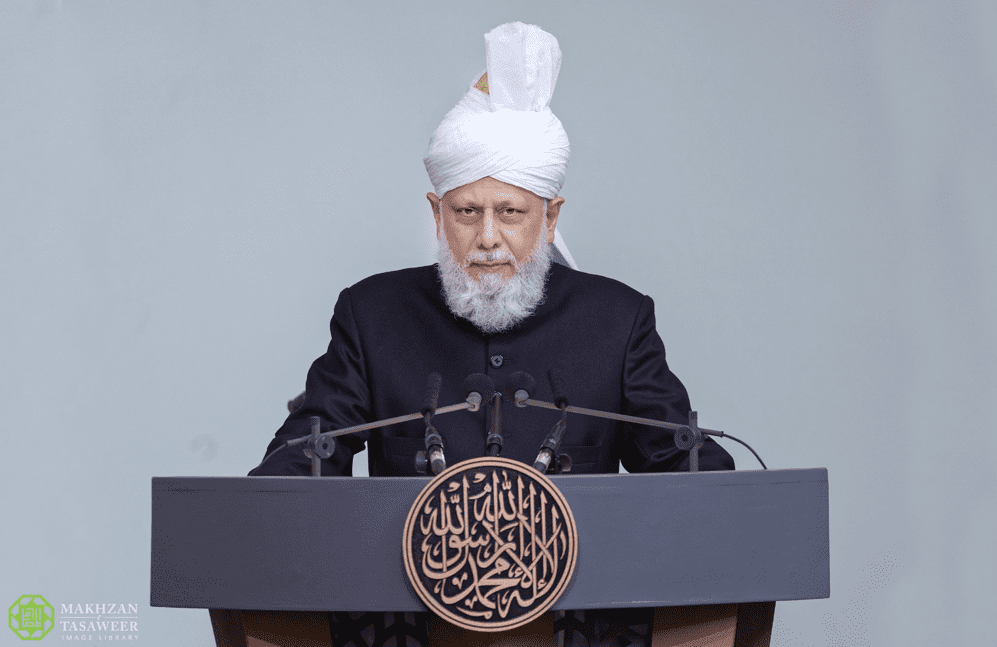Friday Sermon delivered by
Hazrat Mirza Masroor Ahmad(at)
Rightly Guided Caliphs – Hazrat Umar(ra)
After reciting Tashahhud, Ta‘awwuz and Surah al-Fatihah, His Holiness, Hazrat Mirza Masroor Ahmad(aba) said that he would continue highlighting incidents from the life of Hazrat Umar(ra).
Details Surrounding the Martyrdom of Hazrat Umar(ra)
His Holiness(aba) said with regards to the martyrdom of Hazrat Umar (ar) that when he was attacked, it was time for the Fajr prayer [prayer offered right before dawn]. According to some narrations, he was taken home right away, and was in a state of unconsciousness. When he awoke, he asked whether everyone had offered their prayer. He then said that one’s faith was not complete if they abandon prayer, and then he proceeded to offer the prayer himself.
His Holiness(aba) said that Hazrat Umar(ra) asked for an investigation into who it was that attacked him. It came to be known that Abu Lu’lu’, the slave of Mughirah bin Sha’bah was the culprit, and he had attacked others as well. When he was apprehended, he used the same blade to take his own life.
His Holiness(aba) said that Hazrat Umar(ra) was not martyred due to any personal quarrel, rather this was done as a result of a plot. Historians have written that there had been a thought-out plot to martyr Hazrat Umar(ra). A renowned Persian soldier, Hormuzan, who had apparently become a Muslim and was living in Madinah was also a proponent of plotting this scheme.
His Holiness(aba) said that in a way, Abu Lu’lu’ was also against Hazrat Umar(ra) because the Muslims had conquered his land. This also aggravated him and led him to carry out this deed. Thus he sharpened his knife and dipped it in poison. He showed his knife to Hormuzan who said that anyone attacked with it would surely die. It is narrated that someone saw that same knife with Hormuzan and Jufaynah, and when they were asked about it, they replied that they used it to cut meat.
His Holiness(aba) quoted historians that based on the disciplinary measures taken against people like Hormuzan and Jufaynah, as well as the fact that the same knife was seen in their possession prior to the martyrdom of Hazrat Umar(ra), it shows that the killer did not act alone, rather this martyrdom was part of a wider plot, and was implemented by Abu Lu’lu’.
His Holiness(aba) said there was a group of people within Madinah who claimed to be Muslims but were secretly against Islam. This group of people thought that by attacking the leader of Muslims, it would impede upon their unity and thereby weaken Islam. However, it so happened that someone came across the knife even before Hazrat Umar(ra) was martyred, and some even say they saw these three people plotting beforehand. Thus, matters became clear later on and the required actions were taken against the perpetrators.
His Holiness(aba) said that it is recorded by Hazrat Umar’s(ra) son that when his father was attacked, he was beside him. The people asked Hazrat Umar(ra) to appoint a Khalifa after him. He replied saying that there was precedent of someone better than him, i.e. Hazrat Abu Bakr(ra) who appointed his successor. However, he said there was also the precedent of someone even greater than him, i.e. the Holy Prophet(sa), who did not explicitly appoint his successor. Hazrat Umar’s(ra) son knew after his father used this example, that he would not appoint his successor.
His Holiness(aba) said that when Hazrat Umar(ra) was attacked, the pain was excruciating. Hazrat Umar(ra) was assured that the Holy Prophet(sa) had been pleased with him, as had Hazrat Abu Bakr(ra) and the companions of the Holy Prophet(sa). Hazrat Umar(ra) said that this was only by the grace of Allah. He said that he was not fearful for himself, but instead feared only for the sake of Muslims. In fact, he was not afraid of martyrdom as he had prayed for it himself.
Transforming Fear into Peace
His Holiness(aba) quoted the Second Caliph(ra) who explained one aspect of the promise of God in relation to Khilafat, that he will change their state of fear into a state of peace. He explained that Hazrat Umar(ra) himself prayed to be martyred in Madinah and this prayer was accepted. Therefore it cannot be said that his fear was not turned into peace, because he never feared martyrdom in the first place. In fact, this prayer was accepted in a way that Hazrat Umar’s(ra) desire for martyrdom was fulfilled, and it was done so without a foreign army attacking Madinah, thus keeping the Muslims safe. Instead this plot rose from within Madinah, and as such the prayer of Hazrat Umar(ra) was accepted.
His Holiness(aba) further quoted the Second Caliph(ra) who said that prior to the martyrdom, a case was brought before Hazrat Umar(ra) for a very small amount, in which one of the sides was the same person who would go on to become his killer. In this case, Hazrat Umar(ra) made a just decision, and this happened to be against Abu Lu’lu’. This enraged him a great deal, and later he went on to martyr Hazrat Umar(ra). The Second Caliph(ra) explained that even though the decision was regarding a small amount, the simple fact that the decision made was not in his favour enraged him so much that he went on to kill him. Some people are so driven by rage and enmity that they would commit such heinous acts.
His Holiness(aba) continued quoting the Second Caliph(ra) who said in light of this incident and the ensuing disorder that at such times, at the time of prayer, certain people should be appointed for security for the protection of the worshippers.
Hazrat Umar(ra) Concern for Paying off His Debts
His Holiness(aba) said that before he passed away, Hazrat Umar(ra) asked his son about the amount which he owed in debt. This debt had not been incurred due to personal needs, rather it was as a result of tending and caring for the poor and spending on them. Hazrat Umar(ra) instructed his son on how to repay this debt, and very soon after his demise, his son repaid his father’s debt.
His Holiness(aba) said that he would continue highlighting incidents from the time of Hazrat Umar(ra) in future sermons.
Summary prepared by The Review of Religions

